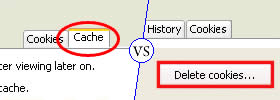Difference between HTML5 and Flash
Key difference: HTML5 is the fifth revision of the HTML standard. HTML stands for HyperText Markup Language. It is a well known mark up language used to develop web pages. The core aims of HTML5 have been to improve the language with support for the latest multimedia. Adobe Flash is a multimedia and software platform that is mainly used for creating vector graphics, animation, games and Rich Internet Applications (RIAs). These RIAs can be played in Adobe Flash Player. Flash is commonly used to add streamed video or audio players, advertisement and interactive multimedia content to web pages.
 HTML5 is the fifth revision of the HTML standard. HTML stands for HyperText Markup Language. It is a well known mark up language used to develop web pages. It has been around for a long time and is commonly used in webpage design. XML or Extensible Markup Language defines a set of rules for encoding documents in a format that can be read by both, human and computer.
HTML5 is the fifth revision of the HTML standard. HTML stands for HyperText Markup Language. It is a well known mark up language used to develop web pages. It has been around for a long time and is commonly used in webpage design. XML or Extensible Markup Language defines a set of rules for encoding documents in a format that can be read by both, human and computer.
HTML is written using HTML elements, which consist of tags, primarily and opening tag and a closing tag. The data between these tags is usually the content. The main objective of HTML is to allow web browsers to interpret and display the content written between the tags. The tags are designed to describe the page content. HTML comes with predefined tags. They allow one to insert images, text, videos, forms and other pieces of content together into a cohesive webpage.
Elements of HTML are the basic building blocks of all websites. HTML allows images and objects to be embedded in the webpage. It can also be used to create interactive forms. HTML also provides the means to create structured documents. It does this by denoting structural semantics for text such as headings, paragraphs, lists, links, quotes and other items. However these days, web pages are rarely designed using only HTML. HTML allows for the programmer to embed scripts written in languages such as JavaScript, which many often do. This changes the look and behavior of the HTML web pages.
The core aims of HTML5 have been to ‘improve the language with support for the latest multimedia while keeping it easily readable by humans and consistently understood by computers and devices, such as web browsers, parsers, etc.’ HTML5 supercedes HTML 4, as well as XHTML 1 and DOM Level 2 HTML. Additionally, as of December 2012, HTML5 is W3C Candidate Recommendation.
HTML5 aimed to address the variety of mixture of features introduced by various specifications by various browsers. It also aimed to address the many syntax errors in existing web documents. Additionally, it attempts to define a single markup language that can be written in either HTML or XHTML syntax. It is also backward compatible with the previous HTML versions.
 Adobe Flash is a multimedia and software platform that is mainly used for creating vector graphics, animation, games and Rich Internet Applications (RIAs). These RIAs can be played in Adobe Flash Player. Flash is commonly used to add streamed video or audio players, advertisement and interactive multimedia content to web pages.
Adobe Flash is a multimedia and software platform that is mainly used for creating vector graphics, animation, games and Rich Internet Applications (RIAs). These RIAs can be played in Adobe Flash Player. Flash is commonly used to add streamed video or audio players, advertisement and interactive multimedia content to web pages.
Flash can create animation of text, drawings, and still images by using vector and raster graphics. It also supports bidirectional streaming of audio and video. Furthermore, it can capture user input mainly through mouse, keyboard, microphone and camera.
ActionScript is commonly used to program Flash applications and animations, while Adobe Flash Professional is popularly used to create Flash content. Flash also supports automation through JavaScript Flash language (JSFL). Adobe Flash Player makes it possible to play Flash content. The player is available free of charge as a plug-in for web browsers for use on computers, and now for smartphones and tablets as well.
Flash is an older technology, as compared to HTML5. It was one of the most popular ways to add interactivity, video and animations to websites. In order to view these videos and/or animations, a Flash plugin needed to be downloaded and installed in the web browser. An advantage for HTML5 over Flash is that as HTML is supported by nearly all web browsers, it does not require an additional plugin to be installed.
Some differences between HTML5 and Flash:
- HTML5 has undoubtedly the biggest potential market reach of any platform.
- Flash requires an additional plugin to be installed in the browser.
- Apple doesn’t support Flash.
- Flash has been termed as being difficult to use on touch devices, slow, battery-draining and insecure.
- HTML5 is like a lightweight, better supported, faster and open version of Flash.
- HTML5 runs natively in the browser rather than through a plugin controlled by a corporation.
- Flash is more popular and more widely used for videos and animation than HTML5.
- Flash has good audio and video support. HTML5 has varying audio and video support, as browsers all support different combinations of audio and video formats.
- Flash has mature tools. Adobe's Flash Builder and other tools are powerful and well-supported. HTML5 content can be written in Javascript and HTML.
- Adobe's tools are also much more expensive than Construct 2 will be. Construct 2 is HTML5 editor.
- In HTML5, full programmatic access is provided for audio and video playback. However, the issue of supported codec is still being debated.
- Flash makes it easier to insert ads within videos presented on the Internet.
- Flash uses more CPU power than HTML5.
- MP4 or H.264, ogg/Theora and WebM are the three codecs that currently support HTML5.
Image Courtesy: w3.org, geek.com









Add new comment